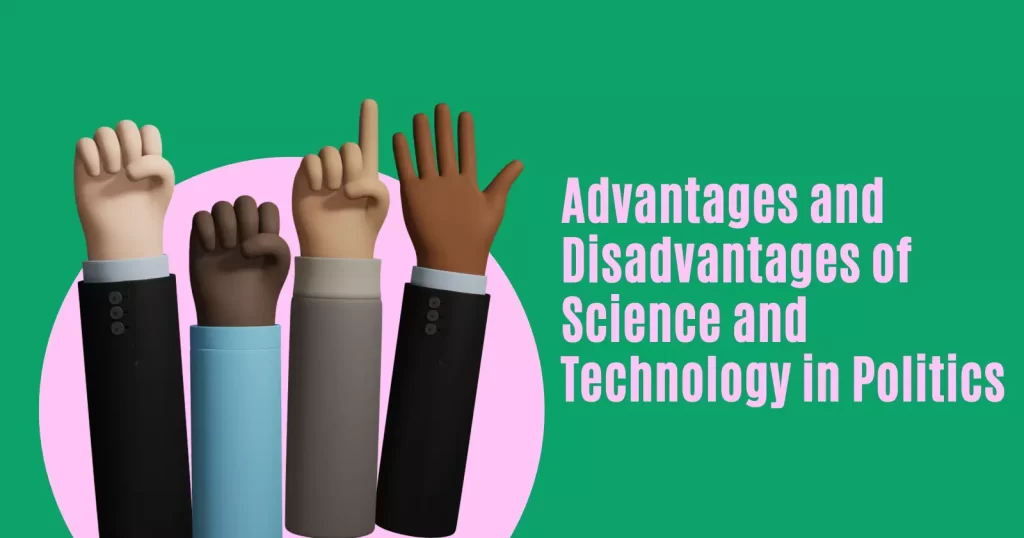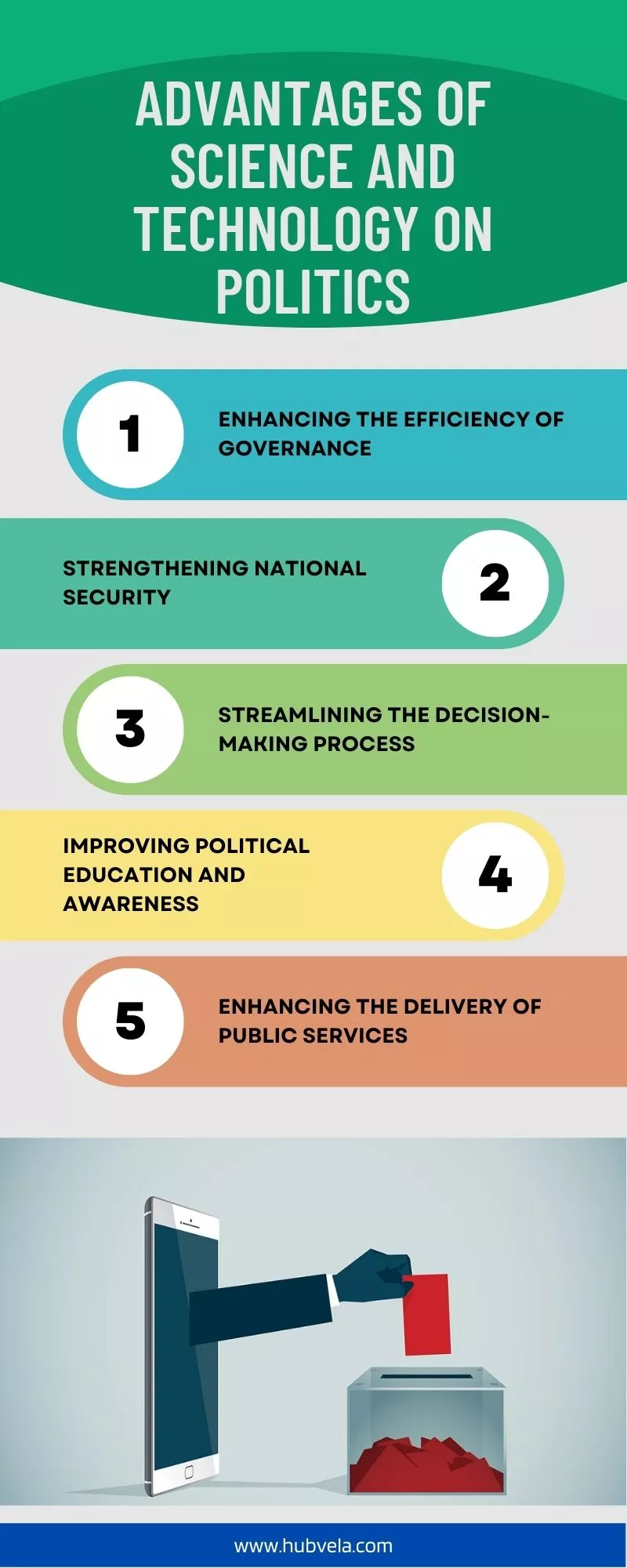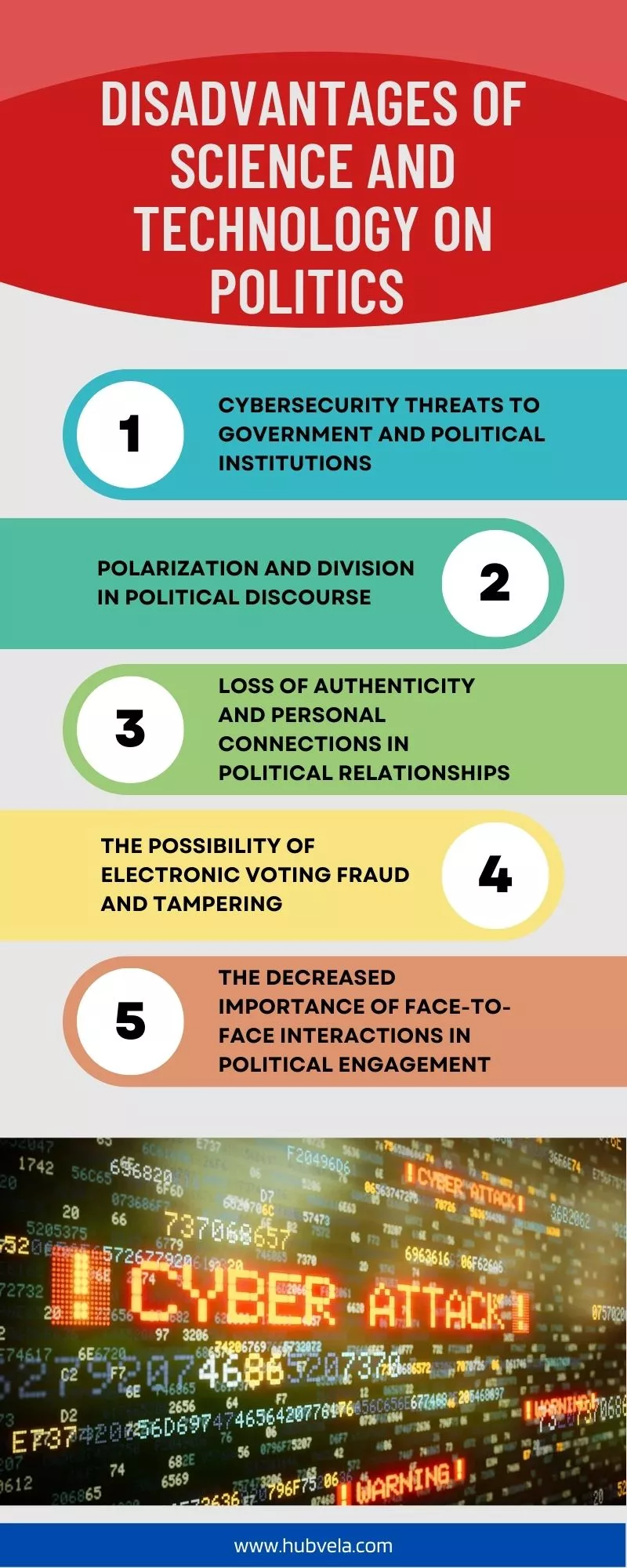Science and technology have revolutionized every aspect of our lives, including politics. The integration of technology into politics has brought about both advantages and disadvantages.
On one hand, technology has made it easier for politicians to communicate with their constituents, gather data, and make informed decisions.
On the other hand, technology has also given rise to new challenges such as cyber-attacks, fake news, and privacy concerns.
In this article, we will explore the advantages and disadvantages of science and technology in politics and how they have impacted the political landscape.

--Advertisement--
Advantages of Science and Technology in Politics
Science and technology have had a profound impact on various aspects of our lives, including politics.
From the abundance of information available to the ease of running political campaigns, technology has revolutionized the way we approach politics.
While some argue that technology has disrupted international politics in negative ways, others believe that it has made people more informed and engaged in the political process.
In this context, it is important to explore the advantages of science and technology in politics.

1. Enhancing the Efficiency of Governance
Science and technology have brought about numerous advantages to politics, one of which is enhancing the efficiency of governance.
With the integration of AI into government operations, governments can maximize the benefits of AI and avoid some of the risks often experienced in the public sector.
Good governance is also crucial in enhancing the effectiveness of the economic development process, and it can play a role in enhancing governance in developing countries.
The value of IT governance cannot be overemphasized, as ineffective governance can have a substantial impact on business alignment and risk management.
Improving public sector efficiency is a challenge, but performance information and its role and use in the budget process can help achieve this goal.
Therefore, science and technology have a significant role to play in enhancing the efficiency of governance, and governments should develop a strategy, governance structure, and change management approach for integrating them into their operations.
2. Strengthening National Security
The role of science and technology in national security is crucial, as it helps in developing strategies to counter threats and protect the nation.
The National Security Science and Technology Strategy is a prime example of how science and technology can be strategically linked to security.
Disease prevention is also an important aspect of national security, and ambitious efforts to prevent diseases have substantially improved the lives of people around the world.
Policymakers must keep in mind that improving foreign assistance is synonymous with strengthening national security.
By investing in science and technology, governments can enhance their capacity to meet evolving challenges to the long-term security of their nations
3. Streamlining the Decision-Making Process
With the help of technology, decision-making can be faster, more efficient, and less prone to error. Information technology provides new ways to outperform and gain a competitive advantage.
Evidence-based decision-making has become a byword for good governance.
Governments around the world are making increased use of innovative tools to anticipate and understand the complexity and uncertainty of societies and nature.
By leveraging technology, policymakers can access vast amounts of data, analyze it quickly, and make informed decisions based on evidence.
This not only saves time but also ensures that decisions are based on facts and not just opinions.
Therefore, the use of science and technology in politics has revolutionized the decision-making process, making it more efficient, effective, and evidence-based.
4. Improving Political Education and Awareness
Science and technology have brought about significant advantages to politics, including increased transparency, efficiency, and accessibility.
However, to fully harness these benefits, there is a need to improve political education and awareness.
As stated by The Political Abyss, mandatory political education can increase political engagement, decrease misinformation, and encourage more young people to participate in the political process.
This is supported by the World Bank, which emphasizes the importance of attending to the technical and political complexities that shape education reforms.
Moreover, technology can be used as a tool to improve political education and awareness.
Technology can be used to increase access to information, facilitate communication between citizens and their representatives, and promote civic engagement.
However, it is also important to acknowledge the potential negative impacts of technology on politics, such as the spread of misinformation and increased political polarization.
While science and technology have brought about significant advantages to politics, there is a need to improve political education and awareness to fully harness these benefits.
By doing so, we can ensure that technology is used as a tool to promote transparency, efficiency, and accessibility in politics, rather than a weapon to spread misinformation and increase polarization.
5. Enhancing the Delivery of Public Services
With data-driven service delivery, governments can predict customer needs, enhance communication outreach, and measure policy effectiveness.
By taking a more personalized, citizen-tailored, and proactive approach to government service delivery models, governments can bridge the gap between service delivery and the digital experience that citizens and businesses have come to expect.
This can lead to cost savings and improved customer user experiences. Technology can also help ensure the continuity of public services.
In short, technology presents a realistic and ambitious vision for harnessing technology to improve service delivery.
Delivering quality public services efficiently and equitably is critical to the creation of public value, and science and technology can play a significant role in achieving this goal.
Disadvantages of Science and Technology in Politics
Science and technology have brought about numerous advancements in various fields, including politics.
However, it is important to acknowledge that there are also disadvantages to the impact of science and technology on politics.
As noted by Steven Feldstein in his article on the Carnegie Endowment for International Peace website, digital technology has disrupted international politics in various ways.
While some people believe that technology has a positive impact on politics, others argue that it can also have negative consequences.
For instance, a study by Pew Research Center found that those who believe technology has made people more informed are also more likely to say that technology has made people easier to manipulate.
Additionally, technology can be used as a political weapon, as noted by Acquia.
It is important to consider both the advantages and disadvantages of science and technology in politics to ensure that we can make informed decisions about their use.

1. Cybersecurity Threats to Government and Political Institutions
The disadvantages of science and technology in politics are evident in the increasing cybersecurity threats to government and political institutions.
As governments and political institutions become more reliant on technology, they become more vulnerable to cyberattacks.
Hackers and malicious cyber actors are targeting healthcare and public health institutions, critical infrastructure, and local governments to make ransomware demands and disrupt services.
The dangers relating to cybersecurity are constantly evolving, and the stakes are high.
Governments need to focus their efforts on strengthening cybersecurity resilience, investigating malicious cyber activity, and advancing cybersecurity alongside democratic values and principles.
It is clear that cybersecurity is too big for governments or firms to handle alone, and a collaborative effort is needed to combat these threats.
2. Polarization and Division in Political Discourse
The disadvantages of science and technology in politics are evident in the increasing polarization and division in political discourse.
As political activism becomes more prevalent, individuals tend to push for policies that align with their party’s ideology, leading to further division between Republicans and Democrats.
This division is further exacerbated by the multifaceted nature of American polarization, which is aligned with ideology, race, and religion.
The rise of political polarization has a powerful grip on the United States, and it has been festering for years.
As technology advances, it becomes easier for individuals to surround themselves with like-minded people and consume news that reinforces their beliefs, leading to an echo chamber effect that further entrenches polarization.
It is important to recognize the role that science and technology play in shaping political discourse and work toward finding solutions that promote unity and understanding.
3. Loss of Authenticity and Personal Connections in Political Relationships
The rise of science and technology has brought about many advantages in politics, but it has also led to the loss of authenticity and personal connections in political relationships.
With the increasing polarization of political views, friendships, and even family relationships are being affected.
Citizens expect politicians to display competence, integrity, and authenticity, but the latter is becoming harder to achieve as politicians become more disconnected from the lives and outlooks of ordinary people.
Social identity theory suggests that our political ideologies are shaped by our personality traits and the groups we belong to.
As a result, people are less likely to interact with those from different political parties, leading to a lack of personal connections and understanding.
Politicians need to recognize the importance of authenticity and personal connections in politics and work towards bridging the gap between different political views.
4. Possibility of Electronic Voting Fraud and Tampering
One of the major concerns is the possibility of electronic voting fraud and tampering.
While some argue that electronic voting is more secure than traditional paper ballots, others are concerned about the potential for hacking and manipulation of results.
Studies have shown that far fewer individuals are concerned about election fraud involving electronic voting compared to other forms of election fraud.
However, there have been documented cases of election fraud involving mail ballots. To combat this, experts recommend using paper ballots to establish a backup record of each vote.
Another solution that has been proposed is the use of blockchain technology to prevent voter fraud. However, the increasing use of electronic devices to check in voters and verify their eligibility has also introduced new vulnerabilities to elections.
While science and technology have brought about many benefits to politics, it is important to address the potential risks and disadvantages, such as electronic voting fraud and tampering, to ensure the integrity of our democratic processes.
5. The Decreased Importance of Face-to-Face Interactions in Political Engagement
There is evidence to suggest that face-to-face interactions are becoming less important in political engagement.
While physical interactions can help reinforce focus and group dynamics, a growing number of people are turning to social media and online platforms for civic and political engagement.
For example, a study found that membership in Facebook groups increased political participation.
Additionally, research has shown that political engagement can have profound consequences for governance and policy selection.
However, some people may still be reluctant to talk about politics in face-to-face interactions, particularly in heterogeneous networks with high levels of disagreement.
Conclusion on the Advantages and Disadvantages of Science and Technology in Politics
In conclusion, science and technology have brought about both advantages and disadvantages to politics. On the one hand, technology has made it easier for people to access information and participate in political processes.
It has also enabled governments to improve their services and communication with citizens.
On the other hand, technology has also led to the spread of misinformation and the manipulation of public opinion. It has also raised concerns about privacy and security.
Therefore, governments need to strike a balance between the benefits and risks of technology in politics.
They must ensure that technology is used responsibly and ethically to promote transparency, accountability, and democracy.


